The Real China
By admin | July 25, 2010
Sunday, July 25
Yesterday was a fun day touring, which I intend to finish writing about quite soon, but today I had the most amazing experience! From school, it was arranged for us to go on a visit to the home of one of our students. Families got to choose which teacher to invite. I have a very quiet student whose English name is Joe, and I got an invitation from his parents.
Some of the American teachers were apprehensive about having to visit a family—what if the family didn’t speak very much English or it was awkward. Patti actually put many concerns to rest by insisting to our Director, Beth, that she tell the families dietary restrictions of each teacher. I myself prefer to eat vegetarian, but I also like to be polite to hosts, and I can try new foods up to a certain point. After several weeks of trying to figure out if a dish was intestines or eggplant without any reliable way to translate, it was very comforting to know that I could just let them know in advance that I would not like to eat meat. As it turns out, Joe’s grandfather was also a vegetarian, so we had a wonderful lunch together.
To start, Joe (his Chinese name is Li Rong Da) and his parents picked me up at the hotel. During last week where we talked about careers, our stories teacher said Joe was writing a book about construction workers, because that was what he wanted to be when he grew up. The day after that, Joe came to school with a note tucked into his name tag that said, “Joe wants to be an architect when he grows up!” In the car, his mom helped him tell me about his favorite tall buildings. He is a very shy child who rarely speaks at school, but he can say “skyscrapers!” He loves the Sears Tower, and the Empire State Building, and the Bank of China building in Hong Kong, and the Taipei 101! I had met Joe’s dad Friday at our performance, and his English was not that clear. His mother speaks English beautifully, it turns out. She works in a bank, and often does projects with English-speaking clients. She told me that his dad is an investor, a stockbroker. He has a Master’s Degree, and apparently has done much studying in English—his reading and writing is excellent, but his spoken English is not so good. He has so few chances to practice speaking in English. Since I have a degree in German, but never get to speak it, I certainly understand that! It is very hard to learn and keep up a language when you live in a place where most people do not speak it.
Their apartment is on the 7th floor of a seven-story building, which is quite short by Shenzhen standards. They apologized for not having an elevator, but I try to take the stairs, rather than the elevator, several times a day to our 5th floor hotel room, so I have been practicing. First, Joe showed me his collection of 3-D puzzles of all of the skyscrapers and some other buildings he loves. In addition to the ones he had mentioned, there was also a hotel in Dubai and a castle from Germany. He still had to punch out the pieces and build his newest, the Pearl Tower from Shanghai. Then he went to work on a special gift for me—it turns out he also loves archeology, so he got a mysterious gift for me. It was a toy that was a block of plaster and a chisel and a small brush. You have to excavate it to find out what is inside! Joe happily chiseled away on the porch while his mother and I talked. When he finished, he proudly brought me the replica artifact that he had “unearthed.” While Joe pantomimed ringing a bell, his mother looked up the Chinese word on the internet so she could tell me it was a chime. It also came with a small book that told more about the history of this sort of chime, in Chinese, of course. She told me it was of the style that is more than 2000 years old. To ring it, you hit it with a stick. Joe’s dad described how they would be lined up by size to make different sounds, like the inside of a piano. The book has a great diagram pointing out the different parts, but unfortunately they were mostly technical terms that Joe’s mom didn’t know the translations for. But, I love it!
Joe’s dad brought out tea and fruit. We had longan, which to me looks like a small lychee and tastes similar, but they did not think they were very similar. There is a big seed in the middle, and they are also known as “eyes of the dragon,” because the fruit looks a lot like an eyeball. We also ate pitaya, which is beautiful on the outside and white with black seeds on the inside. I had seen it many times in the grocery store, but had no idea what it was like. It does not have a very strong flavor, but it tastes like a very subtle kiwi fruit, I think. We also ate Hami Melon, which is very similar to cantaloupe. Joe’s mom showed me on the globe how it comes from the far northwestern region of China, very close to Kazakhstan. She also showed me a list of words she had translated for the day to make sure she knew how to say them in English. Pitaya and longan, for example, which was interesting because I had never heard of those before anyway, but it was so thoughtful! We also looked at the globe to see where San Diego was.
Hai Yu, Joe’s mother, had many questions for me about teaching Joe to read in English! She had a huge library of English children’s books that she has been collecting. She had many sets of leveled readers, as well as many picture books and chapter books. She was starting to worry that the leveled readers were too boring to want to read, and the other books were too difficult, but she loved the stories so much. Frog and Toad was one of her favorites! From what I could tell at school, the Chinese way to teach is with workbooks and repetition. She seemed to confirm this. We talked about the difference between phonics on a worksheet, phonics in a pattern book, and how to teach phonics by reading great stories or looking at the names of your friends and family. She said that Chinese children also learn a lot about the Chinese language from each other’s names. She said she thought her ideas were very different from most Chinese parents.
She also said she thought it was most important in English class to speak in English, even if it is about everyday things, rather than to learn new things. This is exactly what I have always learned about English Language Development teaching, and what has not been planned for our summer camp. I have been trying to explain about this to our director. I think it would be much more effective. Otherwise, the children are just memorizing vocabulary about biomes, careers and world cultures, the three themes of our camp, instead of really learning to speak. The older students who have been learning English for many years are doing better with this content, but I do not think it is right for the younger students.
Anyway, we had so much fun looking at the books in her collection. She has Dr. Seuss and Calvin and Hobbes too! Joe wanted us to watch the Monkey King cartoon. It is a traditional story from China. But by the time we finished looking at the books, he was watching a live action Monkey King on the computer, and was not interested in the cartoon anymore. We tried to watch both for a few minutes, but that didn’t really work out. Hai Yu brought out Joe’s monkey king crown that his grandfather had made him! I don’t know if I mentioned yet that my camera has stopped working—it was never so disappointing as today! Hai Yu took our picture with Joe in the crown, so I will post it when she sends it to me.
Hai Yu showed me some toys her father had made. They looked like rattles—one was a chopstick with a Christmas ornament on it, and the other was a pencil with a paper polyhedron on the end. They were both painted gold, and Joe showed me how he could twirl them around in his fingers. I showed him how I could juggle with three longans, but I also bumped him in the nose, because I am not a very good juggler. I felt horrible about that. Joe also got a staff and showed off his kung fu moves! Did I mention he is six years old! I told him about my friends who spin staff with fire on the ends of it. Joe also spent quite a bit of time examining a spider on the wall. He really wanted to touch it, he said, but he didn’t dare! He has a great curiosity. He also wanted to show me how he played go, which is like Chinese Chess. He has been playing since he was four years old, and his parents say he is very good at it. Hai Yu said it has helped him become very good at math, which was clear.
She explained how Go is the only game a computer cannot win, because there are so many possible moves. But at the same time, it is exceptionally simple. All of the pieces are equal, unlike the pieces in chess, for example. It also seems you can stop at any time and see who has the most pieces, which is quite different when you compare it to most games that can only end in one specific way.
Hai Yu also showed me some books that gave the history of Chinese Characters. It was so interesting! It gave four historical versions of each character, with a picture of what the character described, as well as some other background information. We flipped through a book about animals and one about nature. It was so interesting to see how the symbol for tiger used to be a picture that looked a lot like a tiger. The one for winter looked like a small house with figures in it sitting around a fire. The one for spring looked like running water. The one for man was based on a figure carrying something heavy, and the one for woman looked like a kneeling figure. However, to my eye, the modern characters don’t have any picture information at all.
She also mentioned that Chinese people think English is very complicated, because there are so many words! (She said about 70,000. This Slate article says more.) She said once you know 2,500 key words in China, you can read just about anything. When she put it that way, it kind of makes sense, though at first I thought, there are only 26 letters, and you have thousands of characters. How could that possibly be easier? I guess it really depends on how you look at it!
This history and cultural lesson was fascinating, but it turned out it was also in preparation for a visit to Hai Yu’s parents. They lived just a short walk away. Her father (I’ll call him grandfather) had been a musical instrument importer. Both of her parents were university educated, which was very unusual for their generation. Now that they are retired, her father has many hobbies. One of them is Chinese calligraphy! He was going to give a demonstration for me! Oh, I wish my camera was not broken, and I wish everyone I know had been there! He showed me brushes of many different sizes. Some are several inches in diameter, for making very large posters. He had a large one on the wall that he had made for the Spring Festival, on gold-flecked red paper. Hai Yu explained that it told about families coming together and eating good food and watching fireworks, having a wonderful time. I think it is like a poem, or maybe a word picture would be more accurate.
Grandfather rolled out a scroll of paper about four feet long on his table. He got out a book and chose a saying to write. Hai Yu said it was from a great Chinese educator, and it sounded like she was talking about Lao Tzu. She translated it something like, “If you want to do something big, you have to do the small steps step by step.” This sounds very similar to the proverbs “Great acts are made up of small deeds,” and “The journey of a thousand miles begins with one step,” both of which I found attributed to Lao Tzu with a quick Google search.
The characters are written from right to left in rows. The brush is held straight up and down. It is hard to see how the different widths of the characters are made, but it is lovely to watch! Then, at the end, he wrote the date, the year of the tiger, and his name, all of theses in much smaller characters. Then he got out the box with his chops and the special ink. You don’t just stamp your name carelessly. He carefully considered how the stamp would be placed at the bottom of the row so everything on the page would be arranged just right.
He took out another chop and stamped it at the beginning of the saying. I think what Hai Yu explained was that this was a stamp that told what was important to the writer, and this one said knowledge.
Then it was my turn! Grandfather got out a blank scroll and made the character for middle. He showed me how to hold the brush, which is nothing like holding a pencil. It’s more similar to me to holding chopsticks, but only a little. Mostly, my hands do not have muscles developed to hold something in that way. So interesting! My inclination was to try to hold it at an angle to the paper, but I was corrected to hold it straight up and down. Hai Yu pointed out the order in which to draw the lines from grandfather’s examples. They said I was quite good at it, but I’m pretty sure they were just being polite. Then Joe tried it. Hai Yu said that really, he is too young to learn the calligraphy, but maybe he will learn when he was older. She was so matter of fact when she said most young people do not learn it and it is a skill that is disappearing. To me, this seems like a cultural tragedy! She did say that some young people are becoming interested and starting to learn.
Joe very much used the point of the brush, so his characters were very thin, and did not have the variation of line size. The three of us also did the characters for sun, big and small. Joe then used the brush to spell the words in English under the Chinese characters. He knew how to spell big, and his mom told him the letters for small and sun. For middle, he drew a diagram—a square with a dot in the middle, with an arrow pointing to the dot! Then he painted a sketch of the sun as well!
Then the family presented me with a special gift that grandfather had taken a whole week to make—a special scroll that had Jennifer spelled out in Chinese characters, above the word teacher. The saying in the center was referred to a saying that teachers are like a garden and students are like trees, but also that I am a teacher who has students all over the world! Wow! Also, it was written in seal script, while my name and the date and grandfather’s script was written in running script. Seal script is the 2,000-year-old version of the characters, while running script I think is more like modern cursive. Wow! (There is also standard script, which is more like printing or the typed version of characters.) I do not think I have ever received a more amazing gift! It is like a piece of history and a work of art!
Then we all went out for lunch. In the car, Joe played with a small stuffed bear and a duckling. He taught me how to say little bear (xiao xiong) and little duckling (xiao ya zi). Lunch was very exciting, because I knew where we were! The restaurant was right next to one of the places we have gone for foot massages! Hai Yu explained that it was a Peking restaurant, food in the style of Northern China. It was so nice to go to a place and be able to get some background information about it! That is something we have virtually none of on this trip! Lunch was delicious! Though it has been a little disappointing to find out that almost everywhere else has better food than at our hotel. We started with boiled peanuts and millet congee, which is almost like cream of wheat, but not really creamy. It is very good with soy sauce and pickled something added to it. The tomatoes with sugar and mustard greens were similar dishes to ones I’d eaten at our hotel, but they tasted fresher. We had three types of “Chinese pie.” One was thin layers of dough with leeks. I’ve had it several other places. Another was almost exactly like Navajo fry bread, though with less oil. We had the salty kind (not salty at all) and the sweet kind, which was only a little sweet. Another way to describe it would be like beignets without the powdered sugar. But both were delicious! The third pie was like a fried tortilla wrapped in a very thin cooked egg with something, maybe a little cinnamon, very yummy on the inside.
Another dish was crispy rice with sweet and sour vegetables. There was savory tofu, and dumplings with leeks. There was another sweet dish. I think it was taro, with blueberry sauces. They definitely agreed it was a root vegetable. Joe’s dad tried to find a translation on his phone, but couldn’t. When I suggested taro, he looked that up on his phone to check, but that didn’t come up either. So it was a root vegetable, maybe steamed, as it was not crisp and not mushy either, with a blueberry sauce. As we got up to leave, there was still some left, and Joe slurped it right out of the dish! He was kind of bored at the restaurant, like most six year olds with a bunch of adults.
It seemed like Joe did not think this was the greatest visit in the world, but I had a wonderful time! It is such a unique opportunity to spend the day in the home of people who actually live in the country you are visiting, and this family felt exceptional to me. We have arranged to go hiking up the mountain with 2,000 steps next Saturday morning, and I very much look forward to it. I can’t wait to hear about the visits of the other teachers to other families. Could they all be so culturally and historically rich? They said they were very honored to have me as a guest, but I was truly the lucky one!
Update: Patti got worked over at a two-hour badminton lesson! A fascinating day was had by all!

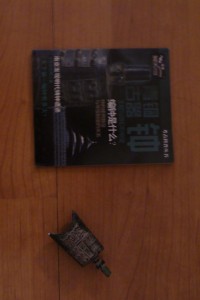
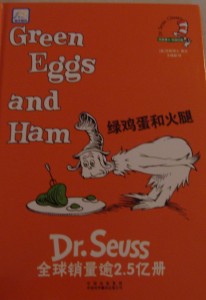
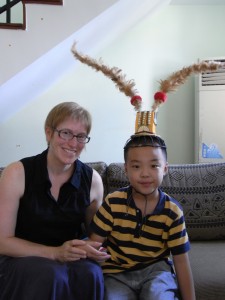
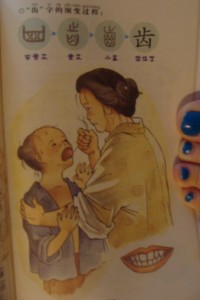
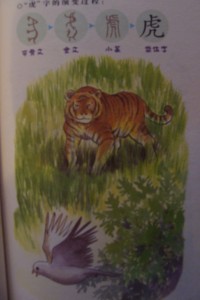
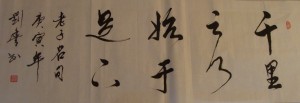
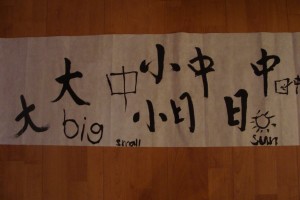
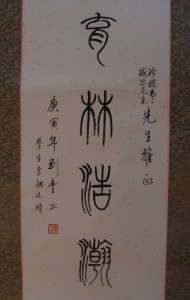

3 Comments
Katie Ross on July 26, 2010 at 11:51 am.
Grandfather’s scroll is amazing! Did they know you came from Xara Garden School? The saying was so perfect.
Nicole Hickman on July 27, 2010 at 10:34 am.
Wonderful story Jenny.
Cat Lucas on July 27, 2010 at 10:09 pm.
What a fascinating story, Jenny! What a BEAUTIFUL gift you received! I bought many symbolic calligraphy images and framed them as gifts for my family when I was in Hong Kong, but… to have one made for you personally… what an honor!
I know your birthday is tomorrow (which may be “today” your time); I hope you have a fantastic birthday! Thinking of you